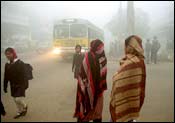Home > News > Specials
The Rediff Special/Basharat Peer
January 28, 2003

His eyes light up as he sees the empty cigarette packet. There is a torn newspaper, too, nearby.
Raghu grabs both and makes his way to his little space outside the orange-painted New Delhi railway station. There is a small fire there, its staggering flame feeding on shreds of cloth, cigarette packets, and pieces of cardboard.
This is Raghu's protection against the killing cold wave that has claimed more than 1,200 lives across north India. Like him, in Delhi alone there are over 15,000 homeless people who depend on rags and discarded papers to keep them alive.
Soon the bits and pieces run out. Raghu's fire dies. The coarse, patched blanket with which he had covered himself cannot keep him warm.
Raghu walks to a closed railway ticket booth. Three men and two dogs have crammed themselves in there.
Raghu spreads a battered sack outside. He curls up on it so the blanket covers him from head to foot.
Out on the street, the night is still young, and the lucky ones who have a home hurry to hot food and warm beds.
Beds unlike what 16-year-old Rahman has: a broken jute mat on a footpath outside the palatial tomb of Humayun, the Moghal emperor.
A bundle of clothes wrapped in a sheet is his almirah by day and pillow at night. A black plastic tarpaulin tied to the iron grills of a park boundary behind the pavement is his roof. And a fire lit of the twigs his 11-year-old sister and ageing mother gather during the day, his heating system.
Early every morning, Rahman leaves in search of work. On a good day, as a daily labourer, he returns with Rs 80. His mother and sister cook on the pavement.
The streetlights fade in clouds of fog. The night air is cruel on the skin, rendering exposed ears and nose-tips sensationless.
In his cotton shirt and battered pullover, Rahman is speaking about the slum in Uttar Pradesh he grew up in. He misses it. He went to school for five years, till he was 13, when his father, a migrant labourer, died of tuberculosis.
Back in his village, there are very few avenues of income. But he has a shelter there, a mud house with a thatched roof. "It was warmer there," he says. "You could sleep."
Rahman's eyes are red. He snuggles under a much-used blanket and pulls the tarpaulin over him, more to save his clothes from getting wet in the dew than to ward off the chill. As the flames begin to falter and the jute mat gets colder, he twitches under it. His mother and sister add more twigs to the fire.
"It gets worse after 3 in the morning," says Shakira, Rahman's mother. "The cold does not let you sleep."
For the homeless, this is what winter means. It is their season of death, when life slips quietly away from freezing bodies sleeping on sweet tea and leftovers -- bodies weakened by infection and exposure.
The Delhi police say they found 3,040 bodies last winter, up from the 2,670 deaths in 2001 and 2,200 in 2000.
This year, the death toll is expected to be greater.
 The influx of migrants to the capital hasn't reduced. Kamal Kumar, 46, is in Delhi this year too, from his village in Gonda, Uttar Pradesh, where his wife and three daughters await his return with money to supplement the meagre earnings from their plot of land.
The influx of migrants to the capital hasn't reduced. Kamal Kumar, 46, is in Delhi this year too, from his village in Gonda, Uttar Pradesh, where his wife and three daughters await his return with money to supplement the meagre earnings from their plot of land.
Kumar rents a handcart at Chandini Chowk in Old Delhi. As devotees sing bhajans in the carpeted halls of a gurdwara close by, he starts his day transporting sacks of flour.
A good day earns him Rs 100. After a simple dinner of chapatis and dal, he smokes a few bidis. Then he curls up on the market pavement.
Facing the pavement is a granite building. It houses a government-run night shelter. Scores of labourers and rickshaw-pullers jostle there for space every night. The roof and blanket comes for a price: Rs 6 a night.
Delhi has 12 such shelters, with a combined capacity of 2,500 -- against its 15,000-odd homeless. In any case, Rs 6 is too much for most people. "I cannot afford to spend so much," Kumar says. "I have a family."
He has a small house in his village. There, he has two quilts and some mattresses.
He will go back in March, he says. If he survives the winter.
Photographs: Saab Press
Image: Rahil Shaikh
The Rediff Specials